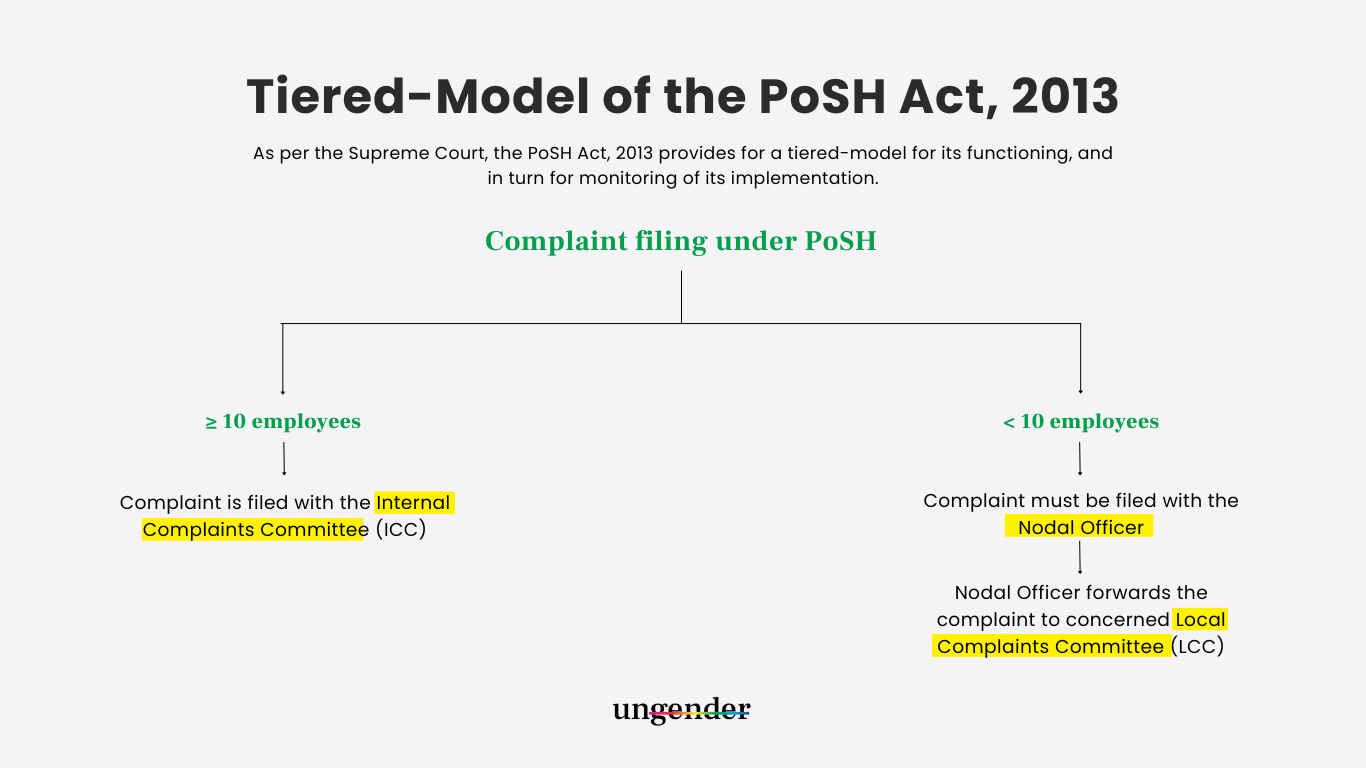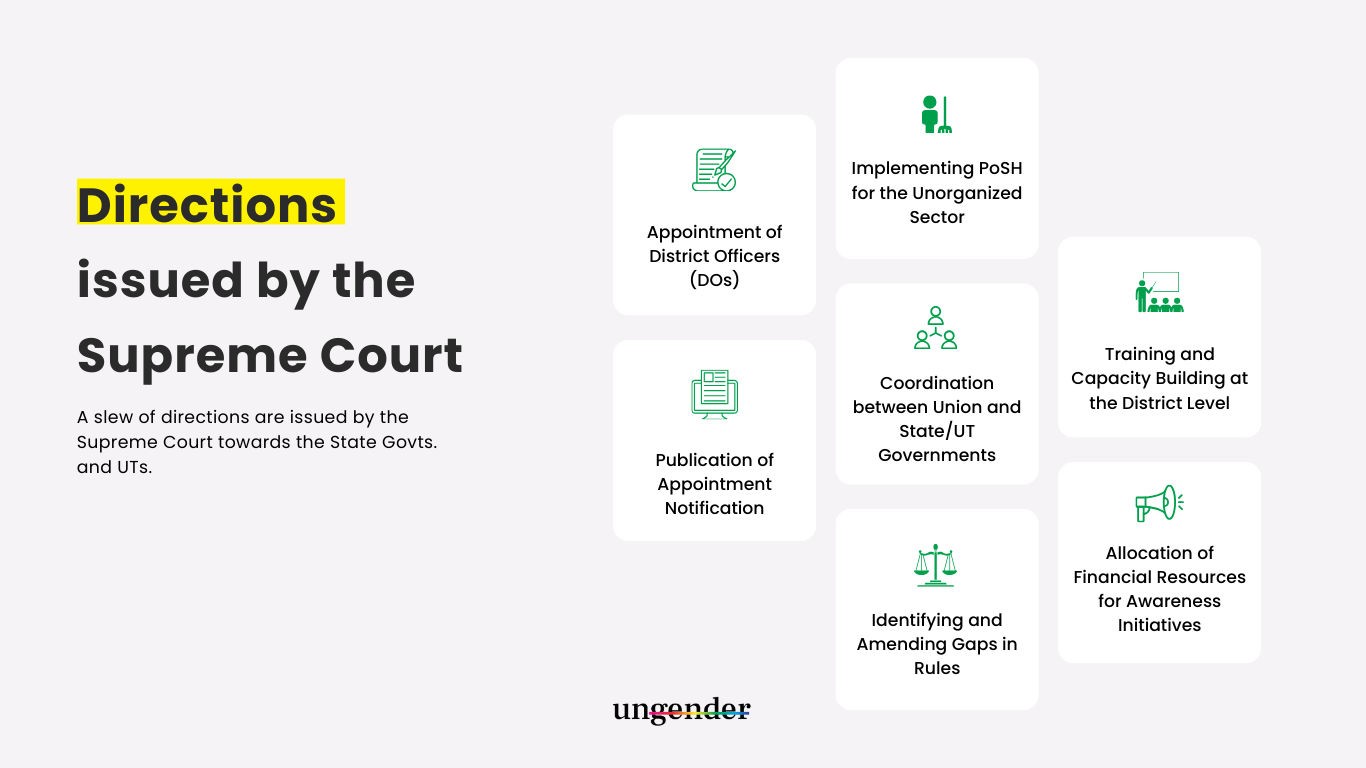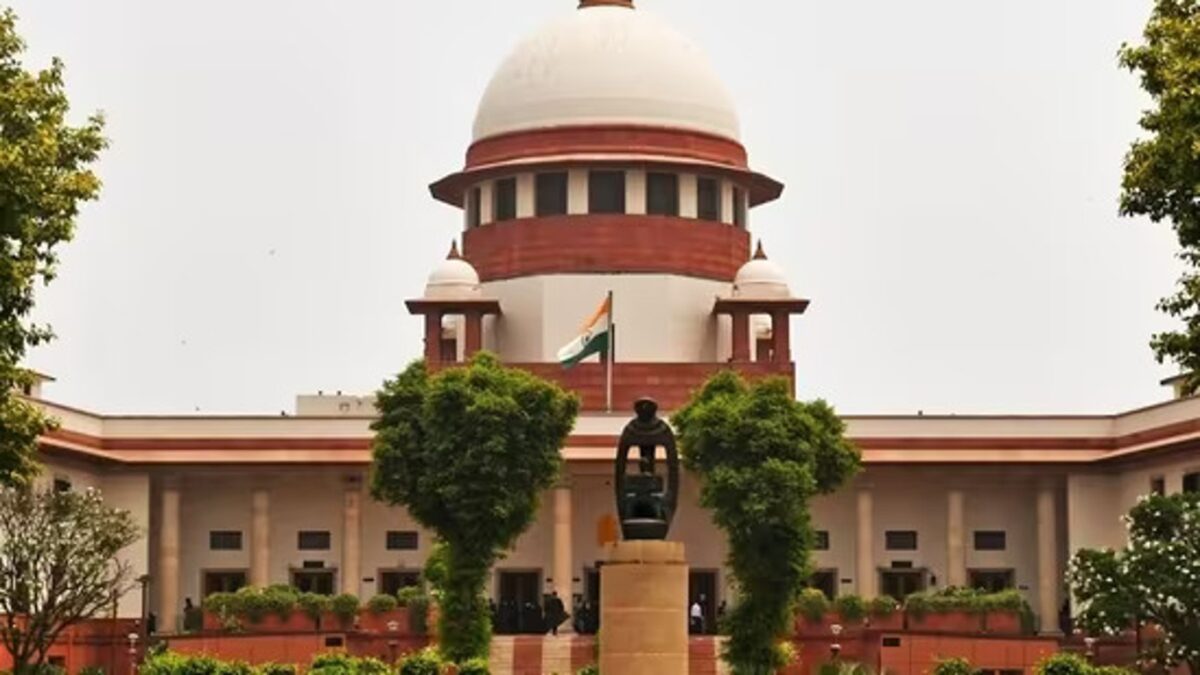PoSH Updates: SC issues Directions to States/UTs for Proper Implementation of PoSH Law

In a significant development, the Supreme Court of India rendered a groundbreaking judgment in the case of Initiatives For Inclusion Foundation (IIF) vs. Union of India.
The petition was filed by IIF to seek the effective implementation of the provisions of the PoSH Act. IIF is an NGO that works with private and government sector organizations, government bodies, and police departments to create awareness and ensure effective implementation of the Sexual Harassment of Women at Workplace (Prevention, Prohibition, and Redressal) [PoSH] Act 2013, and run by our Founder & MD, Pallavi Pareek.
On the intent and reasoning behind this petition, Pallavi says:
“In the meticulous crafting of law, it’s crucial to remember that a law’s intent can only be fully realized with a clear process for its implementation. Merely passing a law is not the endpoint but the commencement of a journey towards achieving its intended benefits. For instance, take the POSH Act, 2013, aimed at preventing sexual harassment at the workplace. While its objectives are commendable, the ambiguity around critical processes – like the filing/collecting of ACRs and monitoring compliance – blurs its efficacy. Without a structured process, how do we ensure that non-compliance penalties, such as monetary fines, are appropriately levied? Who collects these fines, and where do they eventually land? And, if a business license were to be cancelled, what would this process entail? Without these clear directives, the very purpose of the law risks being defeated. Thus, as much as the essence of a law matters, its procedural clarity is the bridge that ensures its benefits reach those it aims to protect.”
What are the prayers sought by the petitioner?
IIF sought the proper implementation of the PoSH Act, 2013. The prayers were mainly centered around various aspects of the law that ensure the law’s proper functioning and monitoring. Certain directions were sought to be given to the States and Union Territories (UTs) all of which are listed below:
- Implementing the PoSH Act without any delay
- Notifying and appointing the District Officers (DOs)
- Constitution of Local Complaints Committees (LCCs)
- Appointing Nodal Officers
- Constitution of Internal Complaints Committees (ICCs) in all workplaces
- Ensuring reporting and collection of Annual Compliance Reports (ACRs) by DOs
- Ensuring that ACRs contain the number of complaints filed and disposed of and are consolidated as reports and published in the public domain
- Ensuring that due publicity is given to the Act and Rules in all districts and awareness activities are undertaken
- Displaying a first of important provisions of the law and displaying it in workplaces
Another direction has been sought to the Union of India to frame rules or directions for
- Providing clarity for the role of Districts in collecting ACRs from ICCs and LCCs, and
- The role of DOs in collecting fines for non-compliance with the Act and appropriate authority for the collection of fines.
Why is the judgment important?
This judgment is crucial in realizing and reiterating the nuances of the PoSH Act, 2013. From stating the provisions related to the collection of annual compliance reports to laying down the operationalities of the Act with respect to the unorganized sector, and elaborating upon the role of the District Officers, the court makes significant observations in this judgment. Each of these aspects has been covered in detail further. But first, let’s dive into a very poignant remark made by the court on the structure of the PoSH Act.
Authored by J Ravindra Bhat, the judgment states that:
“The POSH Act is comprehensive, and a code in itself, for prevention, punishment, and redressal of sexual harassment complaints. It takes the remit of the remedy envisaged in the Vishaka Guidelines beyond the State and public functionaries, to a larger, much wider scope of ‘employee’ and ‘employer’ than any other legislation. As a result, it comes too, with its own challenges for effective implementation. Anticipating this, the Act provides for a tiered-model for its functioning, and in turn for monitoring of its implementation.”
This tiered model has been recognized as below:



1. Annual Compliance Report
The court moves on to address the “lack of clarity” pointed out by the petitioner with regard to the District Officer’s role related to annual reports as per Sections 21 and 22. It states that:
“A reading of these provisions together offers some clarity: both the ICC and LCC prepare annual reports and submit them either directly (in the case of the LCC) or through the employer (here, the ICC), to the District Officer.”
These reports serve as a barometer, indicating the effectiveness of the implemented measures. By mandating their thorough preparation and submission, the Court ensures that every organization remains accountable for its workplace environment, fostering a culture of vigilance against harassment.
After receiving the reports from employers and LCCs, the District Officer must submit a brief report to the State Government. At the last level, it is the appropriate government that monitors the implementation of the law and also maintains the data on the number of complaints filed and disposed of.
2. PoSH for the Unorganized Sector
A significant stride in this judgment is the attention given to the unorganized sector. The court observed:
“This Act is a pioneering legislation with a ‘horizontal’ mechanism and rights framework. A look at some of the definitions – ‘employee,’ ‘employer,’ and ‘workplace’ drives this point home and demonstrates the scope of its horizontal application.”
Further, the court underlined that the inclusion of the definitions such as ‘domestic worker,’ and ‘unorganized sector’ in Section 2 greatly expands the scope of the Act’s applicability. An aggrieved domestic worker can reach out to the LCC and file their complaint.
By recognizing the challenges faced by workers in this sector, the Court underlined the need to spread awareness and make LCCs more accessible. Empowering non-governmental organizations to work closely with District Officers ensures that even in informal work settings, individuals are aware of their rights and have a platform to report harassment without fear of retribution.
3. The Role of District Officers
Further, the court also recognizes the role of the District Officer as “pivotal” and states that they are responsible for implementing several crucial aspects of the law.
A very crucial observation made by the court in this regard is the interpretation of the word ‘may’ in Section 5 of the Act which states:
The appropriate Government may notify a District Magistrate or Additional District Magistrate or the Collector or Deputy Collector as a District Officer. for every District to exercise powers or discharge functions under this Act.
The court said that while the language used is ‘may,’ in the context of the law, the District Officer is the “most important functionary” in the system. They are responsible for keeping the redressal and monitoring framework intact and running it smoothly.
Further, the court observed:
“Treating Section 5 as directory, would leave a gaping hole in the otherwise clearly delineated workflow and redressal mechanism, and the efficacy of this legislation, as a result, falls flat.”
These officers play a central role in constituting ICCs, appointing nodal officers, and ensuring the overall effectiveness of the redressal mechanism. Their proactive involvement ensures a swift response to complaints and a robust support system for victims.
What are the directions issued by the SC?
After making the above observations and establishing clarity on the provisions of the PoSH Act, the Supreme Court issued a slew of directions to further the prayers of the petitioner.



1. Appointment of District Officers (DOs)
The concerned Principal Secretary of the State/UT Ministry of Women and Child (or any other Department) will personally ensure the appointment of a District Officer in each district within their territorial jurisdiction within 4 weeks from the date of the judgment.
DOs must appoint nodal officers in every block, taluka, and tehsil in rural or tribal areas and ward or municipality in urban areas within 6 weeks from the date of the judgment. They must also constitute a LCC as per Sections 6 and 7 of the Act.
DOs are required to ensure due compliance with Section 21(1) and (2) and Section 22, including the collection of reports from ICCs/employers (or information where no report is available) and from the LCCs. They must prepare a comprehensive report to be shared with the State Government.
2. Publication of Appointment Notification
A circular containing the names of the respective DOs and the Nodal Officers with their contact details must be uploaded on the department website. In the absence of this website, notification must be uploaded on the State Government’s website. This circular must be uploaded in a noticeable place along with a compiled version of the Act, Rules, and simple charts/explainers on the basics of the Act, within 6 weeks from the date of this judgment.
3. Implementing PoSH for the Unorganized Sector
District Officers are directed to identify non-governmental organizations working with women and collaborate with them to create awareness within the district. The aim is to dispel the formality associated with LCCs and make them approachable for the unorganized sector.
4. Coordination between Union and State/UT Governments
The Women and Child Development Ministry of every State/UT, through its Principal Secretary, should identify a ‘nodal person’ within the Department. This person will oversee and aid in coordination as contemplated under the PoSH Act, including liaising with the Union Government on matters related to this Act and its implementation.
Each State/UT Government is to submit a consolidated report of its compliance with the issued directions to the Union Government within 8 weeks.
5. Amendments and Gaps in Rules
The Union Government is directed to consider amending the Rules to operationalize Section 26 of the Act. This includes recognizing a reporting authority and/or a fine-collecting authority. The aim is to fill the gaps in the penalty regime contemplated in the Act and address related lapses in the Rules.
6. Training and Capacity Building
State Governments are mandated to organize periodic and regular training sessions at the District level. These sessions are to be attended by District Officers, members of the LC, and nodal officers. The training will sensitize these officials to the provisions of the Act and Rules, emphasizing their roles and obligations.
7. Awareness Initiatives
State/UT Governments and the Union Government are directed to allocate financial resources for developing educational, communication, and training materials. These resources will be instrumental in spreading awareness about the provisions of the Act. Additionally, orientation and training programs will be formulated to educate the public about their rights and the available redressal mechanisms.
Conclusion
The Supreme Court’s judgment in the case of Initiatives For Inclusion Foundation vs. Union of India signifies a monumental leap towards a safer and more respectful workplace culture in India. By meticulously delineating detailed directives, the judiciary has provided a roadmap for the implementation of the PoSH Act that is both comprehensive and actionable. As these directives translate into concrete actions, India takes significant strides towards fostering a society built on equality, respect, and security, ensuring workplaces that are not only productive but also respectful and safe for all. The judgment stands as a beacon of hope, promising a future where every individual can work without fear, and where the fundamental right to dignity finds unequivocal protection.
Looking to comply with the PoSH Act and build a safe workplace for your employees?
Read our insights about diversity, legal updates and industry knowledge on workplace inclusion at Ungender Insights. Visit our Blog.
Sign up to stay up-to-date with our free e-mail newsletter.
The above insights are a product of our learning from our advisory work at Ungender. Our Team specialises in advising workplaces on gender centric laws.
or email us at contact@ungender.in




